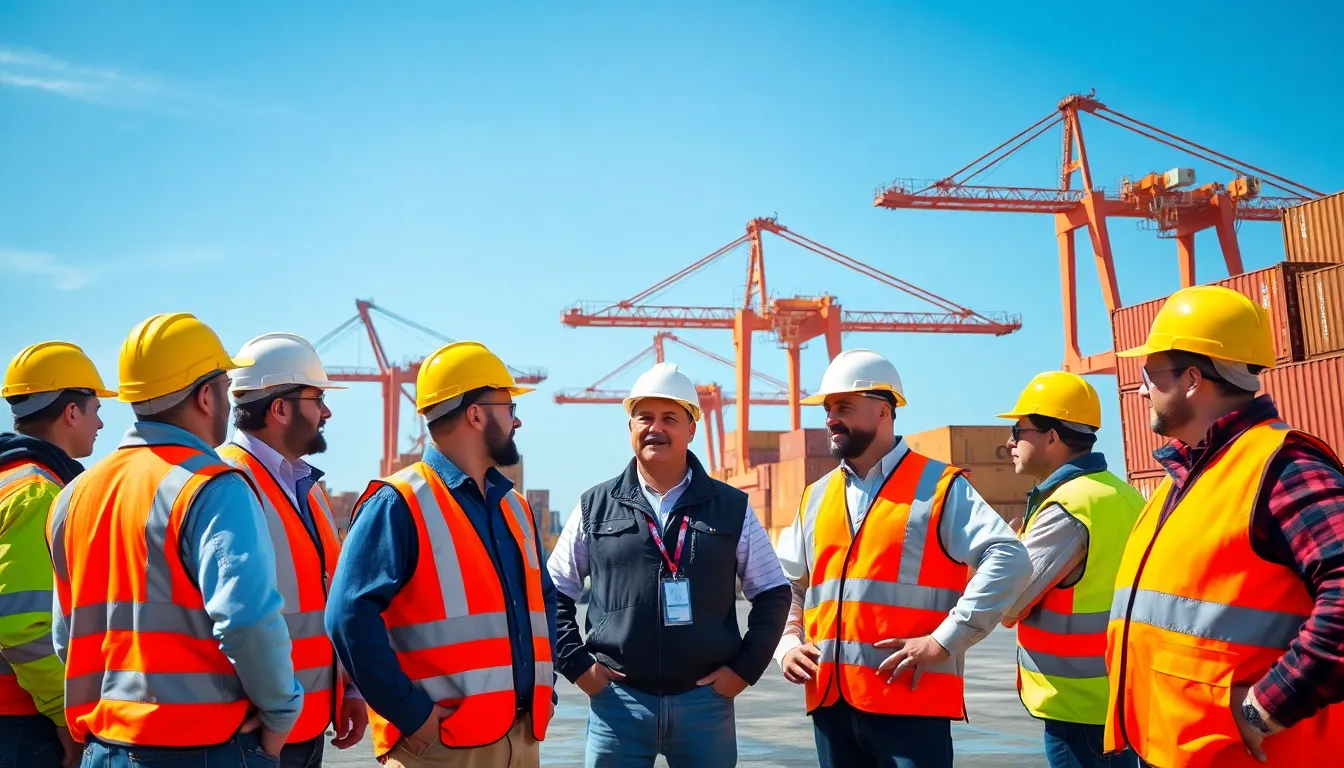In recent weeks, port strikes have captured headlines and disrupted global supply chains, raising questions about their underlying causes. Strikes at key ports highlight the ongoing tensions between labor unions and management, as workers demand better conditions, wages, and job security. These actions not only affect local economies but also ripple through international trade, impacting businesses and consumers alike.
Understanding the complexities of these strikes is crucial for grasping their broader implications. As workers stand up for their rights, the stakes rise for everyone involved, from shipping companies to everyday shoppers. This article delves into the reasons behind the port strike, examining its causes, consequences, and what it means for the future of labor relations in the shipping industry.
Table of Contents
ToggleOverview of the Port Strike
Port strikes represent organized work stoppages by dock workers aimed at addressing grievances with employers. These strikes disrupt shipping operations, affecting the flow of goods across global trade networks.
Definition of a Port Strike
A port strike occurs when workers employed at shipping ports employ collective action to halt their labor. Such actions typically arise due to disputes regarding wages, working conditions, and employment rights. Strikes can significantly delay the loading and unloading of cargo ships, impacting supply chains in various sectors.
Key Players Involved
- Dock Workers: Dock workers, including longshoremen and crane operators, form the backbone of port operations. Their demands often focus on improved wages and safe working conditions.
- Labor Unions: Labor unions represent the interests of dock workers, negotiating on their behalf for better terms. They often organize strikes to amplify their bargaining power against employers.
- Port Management: Port management oversees the operations and administration of shipping facilities. They negotiate with labor unions to reach agreements but may resist demands that affect profit margins.
- Shipping Companies: Shipping companies rely on ports for cargo transportation. Their operations can suffer due to strikes, resulting in increased shipping costs and delays.
- Government: Government authorities may intervene in port strikes to mediate disputes, often prioritizing economic stability and public interest. Their involvement can influence the resolution of labor conflicts in the shipping industry.
Causes of the Port Strike

Multiple factors contribute to the occurrence of port strikes, with labor disputes and economic issues being prominently involved.
Labor Disputes
Labor disputes commonly arise from disagreements over wages, benefits, and working conditions. Dock workers often express dissatisfaction with pay rates that may not align with the cost of living. Contracts may lack sufficient protections for workers, leading to calls for better job security. Unions advocate for improved negotiations with management, citing the need for equitable treatment and fair compensation for labor-intensive work. Escalating tensions between unions and port management can culminate in organized work stoppages as workers seek resolution.
Economic Factors
Economic factors play a significant role in port strikes, influencing both workers and management. Fluctuations in global trade demand often impact shipping volumes, affecting port operations and profitability. Economic downturns may trigger budget cuts, leading to layoffs or reduced hours for dock workers. High inflation rates can erode purchasing power, prompting workers to demand higher wages. Additionally, increased shipping costs and supply chain disruptions can place extra pressure on both labor and management, further fueling disputes that result in strikes.
Impact of the Port Strike
Port strikes significantly alter logistics and commerce, affecting global trade patterns and local economies. Ongoing disruptions from these strikes create ripple effects that extend far beyond port cities.
Effects on Global Trade
Strikes hinder cargo movement, causing delays in shipping schedules and increasing transit times. Businesses relying on timely deliveries face disruptions, leading to inventory shortages. The increased shipping costs can inflate prices for consumers. According to the U.S. Bureau of Transportation Statistics, cargo delays can extend by days or weeks, particularly impacting essential goods like food and electronics. The overall slowdown in logistics can decrease global trade volume, hampering economic growth and creating uncertainty for international markets.
Consequences for Local Economies
Local economies suffer immediate ripple effects due to port strikes. Businesses that depend on port operations, such as transportation services and retail stores, experience revenue declines. Employment rates may fall as companies lay off workers or reduce hours due to decreased demand. For example, the National Retail Federation reported a 15% decrease in sales for businesses around major ports during prior strikes. Additionally, cities hosting major ports may see declines in tourism and local spending, further straining public services and infrastructure. Overall, the financial repercussions of port strikes resonate deeply within communities dependent on port activities for economic stability.
Recent Developments
Recent events surrounding port strikes indicate ongoing tensions between labor unions and management. These developments affect not only local economies but also international trade dynamics.
Timeline of Events
- March 2023: Initial strike actions commence at major U.S. ports, with dock workers demanding wage increases and improved working conditions.
- April 2023: Further negotiations occur, yet labor unions report insufficient progress, leading to additional strike votes among affected workers.
- May 2023: Significant strikes break out across multiple ports, causing shipping delays and disruptions in supply chains globally.
- June 2023: A temporary resolution is reached at some ports, but unresolved issues persist in others, prompting the continuation of strikes.
- August 2023: Labor unions and management resume negotiations, highlighting unresolved concerns over job security and worker safety.
- October 2023: Strikes escalate in response to stalled negotiations, affecting logistics and leading to increased freight costs.
Government Response
- Mediation efforts: Government authorities initiate mediation between labor unions and port management in hopes of reaching consensus.
- Emergency declarations: Some states declare emergencies to facilitate the movement of essential goods during strike actions.
- Legislative proposals: Lawmakers propose legislation aimed at strengthening labor protections while balancing the needs of businesses.
- Increased monitoring: Regulatory bodies increase surveillance of the supply chain to mitigate disruptions caused by the strikes.
- Public statements: Officials emphasize the importance of resolving disputes swiftly, citing the need for stability in both local and global markets.
Future Implications
The ongoing port strikes carry significant future implications for labor relations, economic stability, and global supply chains. As negotiations continue, understanding potential resolutions and long-term effects becomes crucial.
Potential Resolutions
Possible resolutions to current disputes may include enhanced negotiations between labor unions and management. Open communication channels could foster understanding, allowing both parties to address grievances related to wages, benefits, and working conditions. Introducing binding arbitration may ensure quicker conflict resolution, preventing prolonged strikes. Potential legislative changes that support workers’ rights might also arise, providing unions with more leverage during negotiations. Additionally, investing in technology and infrastructure could streamline operations, mitigating future disruptions.
Long-Term Effects on Labor Relations
The long-term effects of the port strikes may reshape labor relations significantly. Enhanced union presence could emerge as workers gain solidarity and recognition of their contributions to global trade. Increased advocacy for labor rights may result, with unions pushing for comprehensive reforms that prioritize job security and fair wages. Management practices may also adapt, focusing more on employee welfare to prevent future strikes. These shifts could create a more balanced relationship between workers and employers, driving collaborative approaches to resolving disputes and fostering a more stable labor environment in the shipping industry.
The ongoing port strikes highlight a critical juncture in labor relations and global trade. As dock workers advocate for better conditions and fair compensation, their actions resonate far beyond local economies. The ripple effects of these strikes disrupt supply chains and challenge businesses and consumers alike.
Future negotiations will be vital in addressing these issues and restoring stability. The potential for enhanced communication and legislative support could lead to more equitable solutions. As the industry evolves, the balance between worker rights and management interests will shape the future of shipping and logistics.






